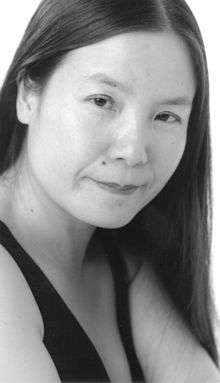Yun Wang

Yun Wang (born 1964) is a poet and cosmologist. She is originally from Gaoping, a small town near Zunyi, in Guizhou Province, China.
Professional work in astrophysics
Yun Wang received a bachelor's degree in physics from Tsinghua University in Beijing, after which she came to the United States and obtained her master's and doctorate (also in physics) from Carnegie Mellon University. Currently a Senior Research Scientist at California Institute of Technology, as well as a Professor in the University of Oklahoma's Department of Physics and Astronomy, she has published over 90 refereed papers, most recently specializing on probing the dark energy in the Universe, with particular attention to the use of supernovae and galaxy redshift surveys as cosmological probes, studies of the cosmic microwave background anisotropy, and the measurement of cosmological parameters.
Yun Wang has developed strategies for optimizing future surveys to probe dark energy, and created a mission concept for the NASA-DOE Joint Dark Energy Mission (JDEM), the Joint Efficient Dark-energy Investigation (JEDI), and served as the Principal Investigator of JEDI. The JEDI/JDEM mission concept illustrates the extraordinary efficiency achievable through innovative instrumentation, and the great scientific advantages of combining three independent observational methods (galaxy clustering, weak lensing, and supernovae) to probe dark energy. JEDI has significantly impacted the design of space missions to probe dark energy.
Yun Wang was elected a Fellow of the American Physical Society in 2012, with the citation: "For her leadership in dark energy research, especially in developing a robust and consistent framework for analysing and interpreting cosmological data to place model-independent constraints on dark energy, and in optimizing the science return of planned space missions to probe dark energy" (from http://www.aps.org/programs/honors/fellowships/archive-all.cfm?initial=W&year=2012&unit_id=DAP&institution=)
Her technical monograph
- "Dark Energy" (ISBN 978-3-527-40941-9) has been published by Wiley in 2010.
Her five most-cited recent papers are the following (with citations from INSPIRE-HEP):
- Wang, Yun; Mukherjee, P (October 2006). "Robust Dark Energy Constraints from Supernovae, Galaxy Clustering, and Three-Year Wilkinson Microwave Anisotropy Probe Observations". Astrophysical Journal. 650 (1): 1–6. Bibcode:2006ApJ...650....1W. arXiv:astro-ph/0604051
 . doi:10.1086/507091. (Times Cited: 285)
. doi:10.1086/507091. (Times Cited: 285) - Wang, Yun; Tegmark, M (June 2004). "New dark energy constraints from supernovae, microwave background, and galaxy clustering". Physical Review Letters. 92 (24): 241302. Bibcode:2004PhRvL..92x1302W. PMID 15245074. arXiv:astro-ph/0403292
 . doi:10.1103/PhysRevLett.92.241302. (Times Cited: 254)
. doi:10.1103/PhysRevLett.92.241302. (Times Cited: 254) - Wang, Yun; Mukherjee, P (Nov 2007). "Observational constraints on dark energy and cosmic curvature". Physical Review. D76 (10): 103533–63. Bibcode:2007PhRvD..76j3533W. arXiv:astro-ph/0703780
 . doi:10.1103/PhysRevD.76.103533. (Times Cited: 201)
. doi:10.1103/PhysRevD.76.103533. (Times Cited: 201) - Wang, Yun; Mukherjee, P (May 2004). "Model-independent constraints on dark energy density from flux-averaging analysis of type Ia supernova data". Astrophysical Journal. 606 (2): 654–63. Bibcode:2004ApJ...606..654W. arXiv:astro-ph/0312192
 . doi:10.1086/383196. (Times Cited: 185)
. doi:10.1086/383196. (Times Cited: 185) - Wang, Yun; Tegmark, M (May 2005). "Uncorrelated Measurements of the Cosmic Expansion History and Dark Energy from Supernovae". Physical Review. D71 (10): 103513–63. Bibcode:2005PhRvD..71j3513W. arXiv:astro-ph/0501351
 . doi:10.1103/PhysRevD.71.103513. (Times Cited: 176)
. doi:10.1103/PhysRevD.71.103513. (Times Cited: 176)
Poetry
Books
- The Book of Jade (ISBN 1-58654-023-8), Story Line Press, 2002; Winner of the Fifteenth Nicklas Roerich Poetry Prize
- The Book of Totality (ISBN 978-1910669136), Salmon Poetry Press, 2015
Chapbooks
- The Carp, Bull Thistle Press, 1994
- Horse by the Mountain Stream (ISBN 0975465309), Word Palace Press, 2016
References
- The Quest for Dark Energy:High Road or Low? Science (magazine), VOL 309 2 September 2005 p. 1483
- New Data on 2 Doomsday Ideas, Big Rip vs. Big Crunch by James Glantz, New York Times, February 21, 2004
- Cosmic Doomsday Delayed by Mark Peplow Nature, no. 41101, 2004 (subscription required)
- ESI Special Topic: Cosmic Microwave Background Radiation Interview with Prof. Yun Wang and Prof. Max Tegmark (April 2007)
External links
- Yun Wang's biography on the Poetry Foundation website
- Yun Wang's home page at California Institute of Technology
- Yun Wang's home page at the University of Oklahoma